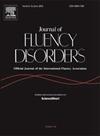心理健康对口吃儿童睡眠的影响
IF 2.1
3区 医学
Q1 AUDIOLOGY & SPEECH-LANGUAGE PATHOLOGY
引用次数: 0
摘要
先前的研究表明,睡眠问题在口吃儿童中很常见。然而,心理健康问题对CWS患者睡眠的影响尚待研究。方法分析美国2012年全国健康访谈调查数据。样本包括155名CWS和8547名6 ~ 17岁的对照组。父母/看护人报告了孩子在过去12个月里是否经常抑郁、感到焦虑/紧张/担心或感到压力。此外,家长/看护人还回答了孩子在过去12个月里是否经常失眠/睡眠困难、白天过度困倦或白天疲劳。结果CWS患者普遍存在心理健康问题,38.4 %的患者至少有一种心理健康问题,而对照组的这一比例为13. % (p <; .001)。睡眠问题在慢性疾病患者中也很普遍,28.0 %的患者至少有一个睡眠问题,而对照组的这一比例为11.4% % (p <; .001)。至少有一种精神健康问题的CWS亚组出现睡眠问题的几率更大(p <; .001),在控制人口统计学、神经发育和过敏/哮喘变量的情况下,效应量很大。讨论心理健康问题与睡眠问题之间的双向关系。目前基于人群的CWS睡眠研究结果与先前关于神经发育障碍和过敏/哮喘的报道相结合。本文章由计算机程序翻译,如有差异,请以英文原文为准。
Influence of mental health on sleep in children who stutter
Purpose
Previous studies have suggested that sleep problems are common among children who stutter (CWS). However, the influence of mental health concerns on the sleep of CWS has yet to be investigated.
Method
American data from the 2012 National Health Interview Survey were analyzed. The sample included 155 CWS and 8547 controls from 6 to 17 years of age. Parents/caregivers reported whether or not children frequently had depression, felt anxious/nervous/worried, or felt stressed in the past 12 months. In addition, parents/caregivers answered if children regularly had insomnia/trouble sleeping, excessive sleepiness during the day, or fatigue during the day in the past 12 months.
Results
Mental health concerns were prevalent among CWS, with 38.4 % having at least one concern, compared to 13.1 % of controls (p < .001). Sleep problems were also prevalent among CWS, with 28.0 % having at least one problem, compared to 11.4 % of controls (p < .001). The subgroup of CWS with at least one mental health concern was at greater odds of sleep problems (p < .001), with a large effect size, controlling for demographic, neurodevelopmental, and allergies/asthma variables.
Discussion
The bidirectional relationship between mental health concerns and sleep problems is discussed. Current population-based findings on sleep in CWS are integrated with those previously reported regarding neurodevelopmental disorders and allergies/asthma.
求助全文
通过发布文献求助,成功后即可免费获取论文全文。
去求助
来源期刊

Journal of Fluency Disorders
AUDIOLOGY & SPEECH-LANGUAGE PATHOLOGY-REHABILITATION
CiteScore
3.70
自引率
14.30%
发文量
23
审稿时长
>12 weeks
期刊介绍:
Journal of Fluency Disorders provides comprehensive coverage of clinical, experimental, and theoretical aspects of stuttering, including the latest remediation techniques. As the official journal of the International Fluency Association, the journal features full-length research and clinical reports; methodological, theoretical and philosophical articles; reviews; short communications and much more – all readily accessible and tailored to the needs of the professional.
 求助内容:
求助内容: 应助结果提醒方式:
应助结果提醒方式:


